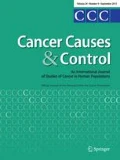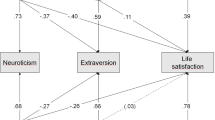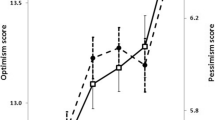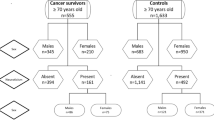Abstract
Objective: To prospectively investigate whether life satisfaction and neuroticism, two measures reflecting aspects of anxiety/depression, are related to risk of breast cancer. Methods: The study population comprised 12,032 women from the population-based Finnish Twin Cohort. Life satisfaction and neuroticism were assessed in health questionnaires in 1975 and 1981. During 21 years of follow-up, 238 cases of breast cancer were documented in the study cohort through record linkage to the Finnish Cancer Registry. Results: After adjustment for age and other important covariates, the hazard ratios were 1.0 (reference), 0.9 (95% confidence interval 0.6–1.3) and 1.0 (0.7–1.6) by decreasing level of life satisfaction (satisfied, intermediate, dissatisfied), and 1.0 (reference), 1.0 (0.7–1.4) and 0.8 (0.6–1.2) by increasing level of neuroticism (low, intermediate, high). These results did not change after accounting for possible changes in the levels of life satisfaction and neuroticism between 1975 and 1981. The null results were also confirmed with the use of a nested case–control study within twin pairs that became discordant for breast cancer during the follow-up. Conclusions: Our data indicate that life satisfaction and neuroticism are not substantially associated with breast cancer risk. These findings provide epidemiological evidence against the doubts that breast cancer would be more likely to occur in unhappy, dissatisfied, and worrying women.
Similar content being viewed by others
References
LeShan L (1959) Psychological states as factors in the development of malignant disease: a critical review. J Natl Cancer Inst 22: 1–18.
McKenna MC, Zevon MA, Corn B, Rounds J (1999) Psychosocial factors and the development of breast cancer: a meta-analysis. Health Psychol 18: 520–531.
Greer S, Morris T (1975) Psychosocial attributes of women who develop breast cancer: a controlled study. J Psychosom Res 19: 147–153.
Morris T, Greer S, Pettingale TW, Watson M (1981) Patterns of expression of anger and their psychosocial correlates in women with breast cancer. J Psychosom Res 25: 111–117.
Jansen MA, Muenz LR (1984) A retrospective study of personality variables associated with fibrocystic disease and breast cancer. J Psychosom Res 28: 35–42.
Kirkcaldy BD, Kobylinska E (1987) Psychosocial characteristics of breast cancer patients. Psychother Psychosom 48: 32–43.
Forse´ n A (1989) Life stress, personality and breast cancer (Doctor's thesis). Helsinki: Foundation for Psychiatric research in Finland, Monogr Psychiatr Fenn no. 16.
Aragona M, Muscatello MRA, Mesiti M (1997) Depressive mood disorders in patients with operable breast cancer. J Exp Clin Cancer Res 16: 111–118.
Hahn RC, Petitti DB (1988) Minnesota Multiphasic Personality Inventory-rated depression and the incidence of breast cancer. Cancer 61: 845–848.
Kaplan GA, Reynolds P (1988) Depression and cancer mortality and morbidity: prospective evidence from the Alameda County Study. J Behav Med 11: 1–13. Psychological factors and risk of breast cancer 197
Bleiker EMA, van der Ploeg HM, Hendriks JHCL, Ade´ r HJ (1996) Personality factors and breast cancer development: a prospective longitudinal study. J Natl Cancer Inst 88: 1478–1482.
Knekt P, Raitasalo R, Helio¨ vaara M, et al. (1996) Elevated lung cancer risk among persons with depressed mood. Am J Epidemiol 144: 1096–1103.
Penninx BWJH, Guralnik JM, Pahor M, et al. (1998) Chronically depressed mood and cancer risk in older persons. J Natl Cancer Inst 90: 1888–1893.
Hjerl K, Andersen EW, Keiding N, et al. (1999) Breast cancer risk among women with psychiatric admission with affective or neurotic disorders: a nationwide cohort study in Denmark. Br J Cancer 81: 907–911.
Johansen C, Olsen JH (1997) Psychosocial stress, cancer incidence and mortality from non-malignant diseases. Br J Cancer 75: 144–148.
Jacobs JR, Bovasso GB (2000) Early and chronic stress and their relation to breast cancer. Psychol Med 30: 669–678.
Hilakivi-Clarke L, Rowland J, Clarke R, Lippman ME (1993) Psychosocial factors in the development and progression of breast cancer. Breast Cancer Res Treat 29: 141–160.
Eaves LJ, Eysenck HJ, Martin NG (1989) Genes, Culture and Personality: an Empirical Approach. London: Academic Press, Harcourt Brace Jovanovich.
Koivumaa-Honkanen H, Honkanen R, Viinama¨ ki H, Heikkila¨ K, Kaprio J, Koskenvuo M (2001) Life satisfaction and suicide: a 20–year follow-up study. Am J Psychiatry 158: 433–439.
Kaprio J, Koskenvuo M, Langinvainio H, Rita H, Sarna S (1987) Psychosocial Factors and Morbidity: Hospitalization and Mortality in the Finnish Twin Cohort. Helsinki: Department of Public Health, University of Helsinki.
Koivumaa-Honkanen H, Honkanen R, Viinama¨ ki H, Heikkila¨ K, Kaprio J, Koskenvuo M (2000) Self-reported life satisfaction and 20–year mortality in healthy Finnish adults. Am J Epidemiol 152: 983–991.
Korkeila M, Kaprio J, Rissanen A, Koskenvuo M, So¨ rensen TIA (1998) Predictors of major weight gain in adult Finns: stress, life satisfaction and personality traits. Int J Obes 22: 949–957.
Koskenvuo M, Langinvainio H, Kaprio J, Sarna S (1984) Health related psychosocial correlates of neuroticism: a study of adult male twins in Finland. Acta Genet Med Gemellol 33: 307–320.
Kaprio J, Sarna S, Koskenvuo M, Rantasalo I (1978) The Finnish Twin Registry: formation and compilation, questionnaire study, zygosity determination procedures, and research program. Prog Clin Biol Res 24B: 179–184.
Floderus B (1974) Psycho-social factors in relation to coronary heart disease and associated risk factors. Nord Hyg T; Suppl. 6.
Viken RJ, Rose RJ, Kaprio J, Koskenvuo M (1994) A developmental genetic analysis of adult personality: extraversion and neuroticism from 18 to 59 years of age. J Pers Soc Psychol 66: 722–730.
Lillberg K, Verkasalo PK, Kaprio J, Teppo L, Helenius H, Koskenvuo M (2001) Stress of daily activities and risk of breast cancer: a 21–year prospective cohort study in 10,500 women in Finland. Int J Cancer 91: 888–893.
Sarna S, Kaprio J, Sistonen P, K oskenvuo M (1978) Diagnosis of twin zygosity by mailed questionnaire. Hum Hered 28: 241–254.
Kujala UM, Kaprio J, Sarna S, Koskenvuo M (1998) Relationship of leisure-time physical activity and mortality. The Finnish Twin Cohort. JAMA 279: 440–444.
Cox DR (1972) Regression models and life tables. J R Stat Soc 34: 187–220.
Liang K, Zeger S (1986) Longitudinal data analyses using generalized linear models. Biometrika 73: 13–22.
Breslow NE, Day NE (1980) Statistical Methods in Cancer Research, Vol 1: The Analysis of Case-control Studies. IARC Scientific Publication No. 32. Lyon: IARC.
Keskima¨ ki I, Aro S (1991) Accuracy of data on diagnosis, procedures and accidents in the Finnish hospital discharge register. Int J Health Sci 2: 15–21.
Teppo L, Pukkala E, Lehtonen M (1994) Data quality and quality control of a population-based cancer registry. Experience in Finland. Acta Oncol 33: 365–369.
Finnish Cancer Registry (2000) Cancer Incidence in Finland 1996 and 1997. Cancer Society of Finland publication No. 61. Helsinki.
Schapiro IR, Ross-Petersen L, Salan H, Garde K, Olsen JH, Johansen C (2001) Extroversion and neuroticism and the associated risk of cancer: a Danish cohort study. Am J Epidemiol 153: 757–763.
Price MA, Tennant CC, Smith RC, et al. (2001) The role of psychosocial factors in the development of breast carcinoma: Part I. The cancer prone personality. Cancer 91: 679–685.
Priestman TJ, Priestman SG, Bradshaw C (1985) Stress and breast cancer. Br J Cancer 51: 493–498.
Chen CC, David AS, Nunnerley H, et al. (1995) Adverse life events and breast cancer: case-control study. BMJ 311: 1527–1530.
McGee R (1999) Does stress cause cancer? BMJ 319: 1015–1016.
Author information
Authors and Affiliations
Rights and permissions
About this article
Cite this article
Lillberg, K., Verkasalo, P.K., Kaprio, J. et al. A prospective study of life satisfaction, neuroticism and breast cancer risk (Finland). Cancer Causes Control 13, 191–198 (2002). https://doi.org/10.1023/A:1014306231709
Issue Date:
DOI: https://doi.org/10.1023/A:1014306231709




